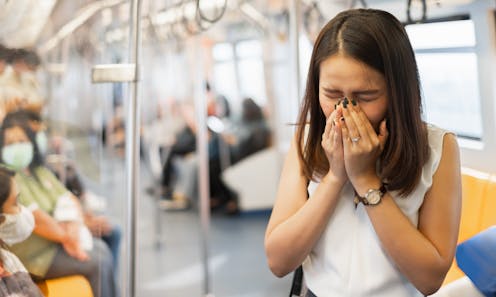I’m considering allergen immunotherapy for my hay fever. What do I need to know?
- Written by Paxton Loke, Paediatric Allergist and Immunologist, Murdoch Children's Research Institute

Allergic rhinitis, commonly referred to as hay fever, is a common allergic disorder affecting up to one in five Australians. Symptoms include itchy nose and eyes, excessive sneezing or clear nasal discharge and nasal congestion.
When severe or untreated, hay fever can affect your quality of life, resulting in poor sleep, impaired learning, and difficulty in concentrating at school or work.
People with hay fever usually use over-the-counter antihistamines as required. For recurrent or frequent symptoms, corticosteroid nasal sprays are preventive medications readily available over the counter, and are most effective when used regularly.
However, if you continue to have severe and troubling symptoms, you might be considering allergen immunotherapy, also known as allergen desensitisation.
Remind me, what happens when you get hay fever?
Hay fever triggers an exaggerated immune response to otherwise harmless airborne allergens such as grass pollen, house dust mite or animal dander. These can end up on the lining of the nose and eyes, which causes irritation.
When encountering these allergens as foreign molecules, the immune system generates proteins, called antibodies. These antibodies are able to accurately recognise that particular molecule as foreign.
In people with hay fever, a particular type of antibody, called IgE, is generated. These allergen-specific IgE antibodies then “prime” or prepare cells in the lining of the nose and eyes to recognise and trigger allergic responses when exposed to these allergens.
When the “primed” cells contact the allergen, they release stored molecules, such as histamine. Histamine acts on neighbouring cells to trigger symptoms such as itch, sneeze and runny nose.
Over time, the ongoing stimulation by the allergen will trigger a chronic response. This leads to nasal congestion and tissue swelling of the nasal, or eye lining.
How does allergen immunotherapy work?
The first step is to ask your GP for a referral to an allergist or clinical immunologist to discuss the best treatment for you.
Your allergist or clinical immunologist will begin by identifying your triggers. This can be done through skin prick tests when you visit the allergy clinic, or through blood tests that detect and measure the proteins (antibodies) that underpin the allergic response.
Allergen immunotherapy dampens the exaggerated response to a specific allergen. It does this by developing cells and antibodies that block rather than activate the immune response against a particular allergen.
Read more: Sneezing with hay fever? Native plants aren't usually the culprit
How is it administered?
Allergen immunotherapy is administered by either injections under the skin (subcutaneous) or drops, tablets or wafers placed under the tongue (sublingual).
The treatment is started by an allergist in the clinic. Injection allergen immunotherapy may then be administered regularly by your GP, usually monthly, while sublingual allergen immunotherapy is taken daily at home.
Patients commonly ask which treatment is better. Research indicates both are effective strategies to minimise the allergic symptoms. For an individual, the choice should depend on a number of patient factors such as asthma, expected tolerability, and, importantly, time constraints (for example, the time it takes to see a GP).
While allergen immunotherapy for children can start as young as five years of age, parents should discuss the best treatment for their child with the allergist. Some children may not tolerate regular injections, while others are unable to hold the tablet under the tongue.
How much does it cost?
The cost vary depending on product as allergen immunotherapy products are not subsidised under the PBS.
The sublingual allergen immunotherapy products costs about A$120-$150 per month.
The injection costs about A$600-1200 per year (approximately A$50-100 per month).
How long does it take to work?
The allergist will determine the best time to start allergen immunotherapy, as some products would be preferable to start before spring (for example, grass pollen immunotherapy).
Effective allergen immunotherapy should minimise the allergic symptoms after re-exposure to the allergen. However, this immune “reset” does not have an immediate effect. Patients on allergen immunotherapy typically only notice improved symptoms after six to 12 months.
Patients who undergo treatment should expect symptom improvement within the first year, although there may be continued gradual improvements over future years of treatment.
Allergen immunotherapy may also help reduces asthma flare ups in people diagnosed with the condition who also get hay fever. It’s particularly effective in preventing asthma flares driven by turbulent weather storms, also known as thunderstorm asthma.
Allergen immunotherapy may also decrease the chance of children with hay fever developing asthma.
What are the side effects?
Allergen immunotherapy through sublingual or injections may typically cause local allergic symptoms such as itch, tingling tongue/mouth or localised redness or pain at the injection site.
Significant side effects from both allergen immunotherapy routes are very rare, and can include a severe allergic reaction, particularly if you have asthma. Patients with asthma should only start allergen immunotherapy if and when their asthma is well-controlled.
Read more: Do I have COVID or hay fever? Here’s how to tell
How long do improvements last?
For effective allergen immunotherapy, patients should receive gradual and regular administration of the trigger allergen(s) for at least three years.
The clinical benefits from allergen immunotherapy are not indefinite, but allergen immunotherapy administered regularly over three to five years will help prolong the sustained response over at least two to three years after stopping.
During this period, patients should have at least yearly reviews with their specialist to ensure the treatment is working and there are no issues with side effects.
Authors: Paxton Loke, Paediatric Allergist and Immunologist, Murdoch Children's Research Institute




